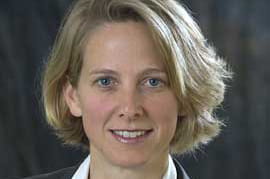What I’m Reading: Mariana Chilton

Dr. Mariana Chilton is a nationally recognized leader addressing child hunger in America and an associate professor at Drexel University School of Public Health. She is also the director of the Center for Hunger Free Communities and founder of Witnesses to Hunger, an initiative designed to increase women’s participation in the national dialogue on hunger and poverty.
Dr. Chilton carved out some time to speak with DrexelNow about her current reading selection, The Warmth of Other Suns: The Epic Story of America's Great Migration, by Isabel Wilkerson.
Why did you choose this book and what is it about?
I chose it because many of my friends and colleagues had been recommending it to me since it came out in 2010. I had heard from at least five different people who read it that, because of my work with hunger and poverty and the inner city, they thought of me when they read the book.
I had no idea what I was getting into.
The book is about the little-known migration of six million African Americans from the Jim Crow south to the north over about a 60-year time span during World War I through the civil rights movement, from about 1915 up to about 1975. Wilkerson tells it so masterfully; she had conducted tons of interviews with people who made the voyage with their children, and she tells the story through the eyes of three different people.
The author shows that this migration is an unrecognized, incredible series of moments in history. It’s so important in American history and it’s so poorly understood. There were massive population effects of racist Jim Crow policies and social structures that forced the migration of six million blacks from the south to the north. Wilkerson includes a rich historical backdrop of everything going on at that time, including the wickedness of the south and the veiled racism of the north. I feel so on edge when I’m reading it—it’s thick with emotion, and very frightening.
What is it about this book/topic that you find important or enjoyable?
This book has made it easier to grasp my work. Through the Witnesses to Hunger program, women share their experiences with welfare, cash assistance and food stamps, and how it helps them or hinders them. Through the lens of the Witnesses, I started to understand the welfare system as a form of slavery. The deepest issues holding us back in terms of hunger and poverty have to do with racism, discrimination and misogyny. Reading this book makes me realize that the effectiveness of Witnesses to stem the tide of racism is just a drop in the bucket; the massive forms of racism I’m reading about in the book are still with us today.
This book is groundbreaking; it’s the modern-day Roots. I think it should be required reading for all kids 13 and up. It will help you understand where we are in the U.S. today, how our inner cities got the way they are, and it will help you understand half of the reasons why we have such deep poverty and how hard it is to escape it.
So far, has the book lived up to your expectations?
It has surpassed all my expectations and I have learned an enormous amount about things I thought I knew. As I read about the discrimination and about how so many families were treated when they got to the north, it was a deepening for me. This story lives with you and haunts you at night. It’s gripping; I can’t put it down.
Is there a passage or a quote you find particularly interesting?
“Thus began a pattern of overcharging and underinvestment in black neighborhoods that would lay the foundation for decades of economic disparities in the urban north.”
This quote taught me how Philadelphia came to have so much urban blight, and about how the slum lords profited off the great migration. Slum lords still continue in many neighborhoods today and it’s just shocking.
In This Article
Drexel News is produced by
University Marketing and Communications.